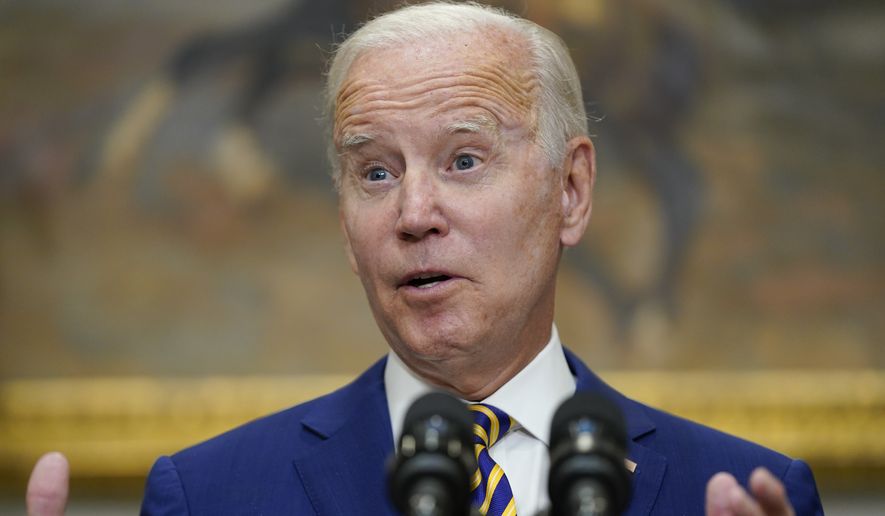OPINION:
Americans of a seasoned vintage can clearly recall the gripping dread of nuclear war. Those forgotten fears are now haunting younger generations, thanks to President Biden’s “Armageddon” imagery in describing the peril posed by Russia in its faltering invasion of Ukraine. As the nation circles back and reprises a dreadful era in which biblical destruction seemed imminent, an accounting for the cause must include foolish lapses in leadership by the president himself.
Mr. Biden reportedly told a group of donors on Thursday the United States could face “the direct threat of the use of a nuclear weapon if, in fact, things continue down the path they are going.” He added, “We have not faced the prospect of Armageddon since Kennedy and the Cuban missile crisis.”
The White House scrambled to clarify that the president’s remarks were meant as a rebuke of reckless nuclear rhetoric from a Russian President Vladimir Putin hoping to reverse battlefield losses rather than a report of heightened Russian nuclear readiness. Nevertheless, Americans — old and young alike — can’t help but shiver at the thought of the unthinkable.
It hasn’t helped to lessen the current level of anxiety that the Department of Health and Human Services announced last week that it is purchasing $290 million worth of Nplate, a drug approved to treat blood cell injuries resulting from acute radiation poisoning. In light of Mr. Biden’s unguarded words, the timing of the purchase dredges up memories of the Cold War era when children were taught their best shelter from the Bomb was a sturdy schoolroom desk.
It was 60 years ago this month that the Cuban missile crisis unfolded, reckoned by historians as the moment in which humanity came closest to full-scale nuclear annihilation. Then, the deployment of Soviet ballistic missiles in Cuba pointed at U.S. targets triggered a rapid escalation of military tension between the two nuclear powers. Thankfully, war was averted when the Soviets agreed to remove the weapons and the U.S. vowed to similarly dismantle missiles stationed in Turkey. Americans, including a 19-year-old Joe Biden, breathed a sigh of relief.
The Cuban nuclear scare demonstrated the escalatory nature of military provocation. Sadly, Mr. Biden has proved that military fragility can have the same effect. His ill-advised decision to pull U.S. forces out of Afghanistan abruptly a year ago signaled an America in decline. Coupled with his suggestion that a “minor incursion” into Ukraine would likely be met by NATO nations with a war of words rather than weapons, the president left Mr. Putin with the impression that “go time” had arrived for his Ukraine offensive.
Since then, the Russian ruler has warned that NATO interference could induce him to push the nuclear button. Such a move could take the form of a demonstration of might over remote territory, say analysts, or even a targeted attack on Ukrainian forces.
As Mr. Biden warns of “Armageddon,” Americans cannot but cringe at the knowledge that he himself has contributed toward the looming threat by conjuring up a perception that the United States is a superpower no more.




Please read our comment policy before commenting.